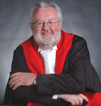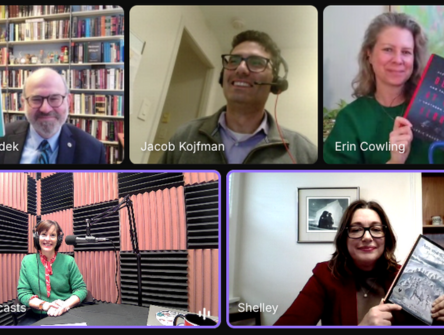Molly Bishop Shadel still can’t forget her first court appearance — and the compassionate judge who kept it from turning into a disaster.
A young lawyer working for the U.S. Department of Justice, she could not find her voice. “I was so terrified that even though I knew what I needed to say, I found that I couldn’t make any noise,” she recalls.
“My voice completely failed me. But the judge was so kind. He saw that I was completely petrified and he said: ‘Counsellor, take a deep breath. Think about what you need to tell me and then just tell me.’”
So she did — and learned an important lesson in how to be an effective public speaker.
Shadel asked herself: ‘What does this judge need to know in the simplest terms possible?’ She found her voice and summoned the words.
“I learned two things from that,” she says. “For me it helps to take five minutes, compose myself and warm up a little bit before I do an important presentation. I slow my breathing down, speak out loud, say a few things, do a few voice exercises that help me get ready to go. Then, instead of thinking of how terrified I am, I think about how excited I am to do this. Somehow that mental adjustment helps me a lot.”
A professor of law at the University of Virginia, Shadel is the author of two books on public speaking: Tongue-tied America: Reviving the Art of Verbal Persuasion and Finding your Voice in Law School. She is also a sought-after speaker at organizations inside and outside of the legal profession.
“Public speaking helps hone your skills,” she says. “It’s also a way to get your name out there. It’s how people are going to know who you are so that when they’re trying to find a lawyer, your name is going to come up because you have started to create a professional reputation.”
She believes public speaking is even more important now because too many lawyers rely too heavily on blogging, e-mailing, tweeting and other social media.
“Being too attached to social media and electronic communication can be a real mistake,” she cautions. “If you are communicating with people electronically, then you’re not practising communicating with them face to face. So you’re missing picking up on their cues. You’re missing the practice you need in order to make that personal connection.”
Being a good public speaker sets you apart from the crowd, she says.
“For my law students, that’s really how they are going to be judged. Potential employers aren’t going to be looking at what you’re writing on a blog. They’re going to be looking to see how well you speak in an interview. So you need to know how to do it just to get a foot in the door.”
Established lawyers also can benefit from taking their expertise to the podium. “We take the ability to speak well as a proxy for intelligence. If you can master this skill it’s going to put money in your pocket.”
But getting on the speaking circuit initially requires some outreach. Shadell suggests starting with your local bar association.
“They frequently have conferences so if you want to be tagged as speaker, find out when the next convention is, what their topics are and find one you know something about. Then let the organizers know you would like to be on that panel, or make a presentation. Once you do one or two, people see those programs and you get tons of phone calls.”
Molly Bishop Shadel was scheduled to speak in June at a conference on oral advocacy sponsored by the Advocates Society of the Law Society of Upper Canada.
How to find your audience
- Check your local library, Chamber of Commerce, professional associations, hospital boards and NGOs to see whether they have a Speakers Bureau. Register with them and provide an outline of your areas of expertise.
- Create a niche. If you practise real estate law, offer to speak at a realtors’ conference, a contractors’ annual meeting or a construction or trades association. Ask what aspect of real estate law they would be most interested in and tailor your speech to the topic.
- Contact your provincial bar association and offer your services as a speaker, panellist or moderator for meetings, conferences or lunch & learn sessions.
- Develop a pool of media spokespersons for your law firm. Let reporters know that when a story breaks, you or one of your colleagues can provide legal commentary or interpretation.
- Speak at media conferences. The Canadian Association of Journalists holds an annual national conference which often features speakers on topics such as constitutional law, access to information and privacy laws. Specify your area of legal expertise and offer up your services. Talk about the legal ramifications of hot topics in the news.
- Tap into universities, colleges, continuing and adult education courses. They are frequently looking for guest lecturers in law, medicine, nursing, criminology, journalism, gender studies, and other areas. Go through the dean’s office, communications department or public relations office.
Advice from the experts

Judge Raymond E. Wyant,
Provincial Court Judge,
Provincial Court of Manitoba
“Speak with passion and from the heart, no matter what the subject. I love to speak and I immerse myself in my speech and use adrenaline and ‘nervous energy’ to keep me sharp and focused. I try to make eye contact with my audience and to make a connection with them. I don’t rely on external aids like PowerPoint or a prepared speech. I think they detract from my speech and my spontaneity. I usually have a few pieces of paper with illegible ‘chicken scratches’ with me for security. I know how I am going to start and end. The middle is the fun part!”


Susan Lightstone,
Senior Educational Consultant,
Ontario Court of Justice
“Before you step onto the stage, invest time in preparation. Practise your speech, read it out loud so it doesn't sound like a grocery list, and get the timing down pat. There’s nothing worse than going on too long.”


Justice Jim Williams,
Supreme Court of Nova Scotia,
Family Division
“Ensure that as a speaker you have a clear understanding of what you have been asked to do, for who, and in what context: are there other speakers; is there a desire to create some controversy; is there a question period or other form of audience participation; are there particular sensitivities? Having a clear understanding of the expectations of the organizers and context of the speaking engagement are good first steps in considering whether to speak, what to say and how to say it.”
From the Masters
10 tips for a successful talk
You could start with a joke to put your audience at ease. You could imagine everyone in their underwear to put yourself at ease. But there are better ways to ensure your speech goes smoothly. Toastmasters International, a nonprofit, educational organization that helps members hone public speaking skills, offers these 10 tips.
1. Know your material
Pick a topic you are interested in. Know more about it than you include in your speech. Use humor, personal stories and conversational language — that way you won’t easily forget what to say.
2. Practise, Practise, Practise!
Rehearse out loud with all equipment you plan to use. Revise as necessary. Work to control filler words. Practise, pause and breathe. Practise with a timer and allow time for the unexpected.
3. Know the audience
Greet some of the audience members as they arrive. It’s easier to speak to a group of friends than to strangers.
4. Know the room
Arrive early, walk around the speaking area and practise using the microphone and any visual aids.
5. Relax
Begin by addressing the audience. It buys you time and calms your nerves. Pause, smile and count to three before saying anything. (“One one-thousand, two one-thousand, three one-thousand. Pause. Begin.) Transform nervous energy into enthusiasm.
6. Visualize yourself giving your speech
Imagine yourself speaking, your voice loud, clear and confident. Visualize the audience clapping — it will boost your confidence.
7. Realize that people want you to succeed
Audiences want you to be interesting, stimulating, informative and entertaining. They’re rooting for you.
8. Don’t apologize for any nervousness or problem
The audience probably never noticed it.
9. Concentrate on the message — not the medium
Focus your attention away from your own anxieties and concentrate on your message and your audience.
10. Gain experience
Mainly, your speech should represent you — as an authority and as a person. Experience builds confidence, which is the key to effective speaking. A Toastmasters club can provide the experience you need in a safe and friendly environment.



